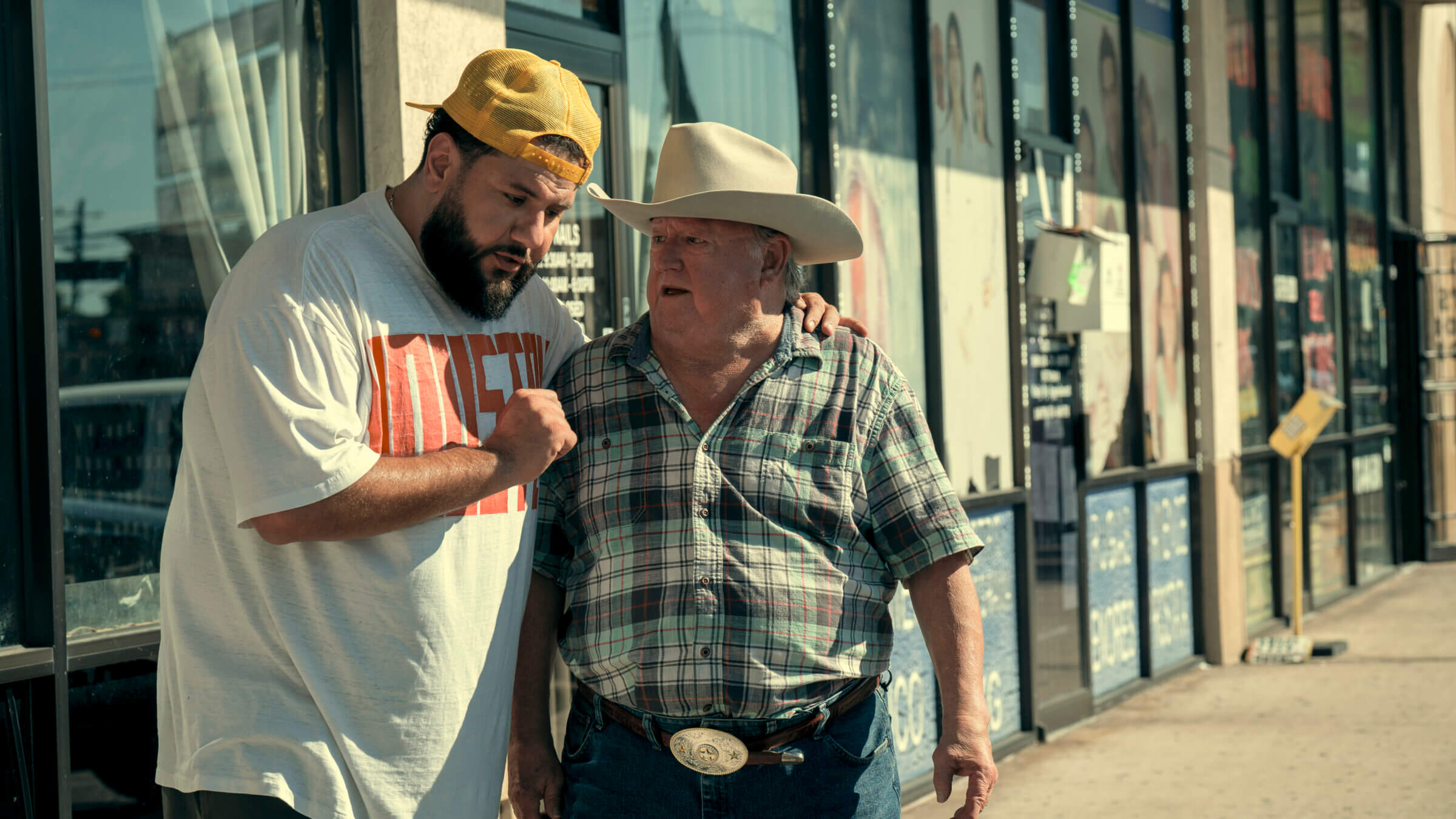What American Jews can learn from watching ‘Mo’
The Palestinian comedian Mo Amer’s debut Netflix series flips the script on stale Israeli-Palestinian debates

MO. (L to R) Mo Amer as Mo, Rutherford Cravens as Jim in episode 101 of MO Photo by Rebecca Brenneman/Netflix © 2022
The final episode of the new Netflix comedy series “Mo” should be required viewing for every Jew.
Mo Amer’s debut show tracks the titular character’s life as a Muslim immigrant living in Houston trying to hustle a living — selling knockoff Rolexes from the trunk of his car, DJing at a strip club — as he navigates a complicated relationship with his Latina Catholic girlfriend, his family, his faith, and the United States’ immigration policy.
Mo’s family arrived from Kuwait following Saddam Hussein’s invasion in 1990, by way of Israel and the West Bank, and they have been awaiting legal asylum papers ever since. In the first episode, Mo is fired from his job at a phone store when the manager gets nervous about his legal status.
“It’s not the first time ICE has run me out of a job,” Mo says.
The story parallels that of the series’ creator and star. His family fled Haifa when Israel became a state and settled in Burin, near Nablus in the West Bank. They then moved to Kuwait, where his father became a successful electrical engineer — only to flee again, to Houston, where Amer faced many, but not all, the same struggles as his character.
This is the first American series to feature a Palestinian main character. But if that’s a heavy weight, Amer, a big, bearded bear of a dude, carries it not just lightly, but perfectly.
Muslims and Palestinians have figured in other American TV shows, usually in dramas, sometimes as good guys, usually as bad guys. But Mo is just a guy — struggling, full of B.S., sincere, vulnerable, tough, fast-talking and funny.
Amer told NPR he identifies as a “Texan Palestinian,” and the show’s humor mines the way those two identities clash and blend. When a supermarket worker offers him a sample of chocolate hummus, Mo throws a fit.
“You know what you just did,” he says, “you just insulted my grandmother.”
Solace, success and perhaps salvation comes, as it often does in Texas, when Mo strikes oil. But the comic, very Palestinian twist is that the oil Mo finds is olive oil. He gets work at an olive grove on Houston’s outskirts, which becomes a source for his mother’s homemade olive oil.
In this Palestinian Texas family, olives, not wells, are the source of the most valuable oil — think of the Windex in “My Big Fat Greek Wedding,” but delicious. The trees connect the stateless Mo to the ancestral homeland he can no longer visit.
Even explaining to fellow Texans where he is from is … complicated. When the olive farmer assumes Mo means Palestine, Texas, Mo corrects him, “No, like Jerusalem.”
“Oh, Israel,” the man says.
Mo sighs, “It’s a branding issue.”
Throughout the series, Mo uses two words to describe his relationships with his girlfriend, mother and brother, his immigration status, and the legality of what he sells: “It’s complicated.” That goes for the show’s approach to the Israeli-Palestinian conflict, too.
When two recurring older characters, a Jewish and a Palestinian man, start shouting simple, Twitter-esque arguments about Israel at each other, Mo shouts back at them, “Rabin, Arafat, you guys done recording your podcast?”
Mo’s mother bitterly blames the “Zionists” for exiling her from Haifa, but the family fires its smarmy Palestinian immigration attorney and hires a quirky Jewish one.
When his nephew can’t throw a straight pitch in his Little League game, Mo reminds him he comes from a proud tribe of rock throwers. The next pitch is much worse.
But it’s in the final episode that Amer fully, brilliantly dramatizes the conflict’s complications.
Mo and a friend confront a man who has been stealing his boss’s olive trees. When Mo demands he return the trees, the thief explains the farm’s land once belonged to his Native American ancestors before the Spaniards and then the Texans took it. The land and what grows on it, he tells Mo, are rightfully his.
“They drove us off our land, nearly killed us all,” the man says. “You want me to give the trees back?”
That script flip says everything you need to know about the series. What can Mo say to that? Who’s not living on stolen land? Who hasn’t benefited from another’s suffering? When does a refugee stop being a refugee? Who isn’t guilty of justifying injustice?
“I get it,” Mo responds to the thief. “My family’s from Haifa, and we were forced out of there by the Israelis.”
His description of the separation barrier that divides families from another and from their own land spirals into a comic, stream-of-consciousness attack on the rich, Elon Musk, global warming, the moon landing — until the thief gives him a hard squint.
“What the f— are you talking about?” he asks.
What Mo’s talking about — what his creator Amer wants us to understand — is that the pain his family endured is real, but there are no simple answers to its relief. Who’d have thought a Netflix streaming comedy series would provide just the right intellectual framework for a discussion of the Israeli-Palestinian conflict?
If you don’t think it’s complicated, get a podcast. As for me, I’ll wait for the second season of “Mo.”





















